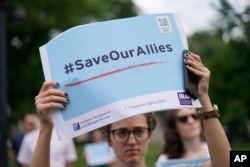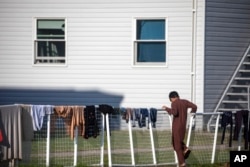After nearly 20 years of war, the U.S. and its allies left Afghanistan last August, helping to evacuate more than 130,000 Afghans in the chaotic last weeks in Kabul. Many of those Afghans hoped for a life in the U.S.
The U.S. offers few primary avenues for Afghans seeking entry. One is a decade-old special immigrant visa program for military interpreters and others who worked on government-funded contracts. Another is a refugee admission program run by the State Department in conjunction with other agencies. A third path is humanitarian parole.
Humanitarian parole is special permission given to those hoping to enter the United States under emergency circumstances. Though it does not automatically lead to permanent residency, "parolees" can apply for legal status—either through the asylum process or other forms of sponsorship, if available—once they're in the U.S.
The Biden administration received more than 40,000 requests for humanitarian parole for Afghan nationals outside the U.S. So far 160 cases have been conditionally approved, per data sent to VOA by U.S. immigration officials.
An additional 930 cases have been denied, leaving thousands of Afghans who are seeking temporary entry into the U.S. stuck in Afghanistan and other countries.
Stringent criteria
Immigration attorney Mahsa Khanbabai, an elected director of the board of the American Immigration Lawyers Association (AILA) and co-chair of AILA's Afghan task force, said part of the problem is how the U.S. Citizenship and Immigration Services (USCIS) decides to whom they are going to give humanitarian parole.
"They have extremely stringent criteria, which is immensely problematic and upsetting for a lot of people because we expected the government to use ... its broad discretion to grant parole," Khanbabai told VOA. "... There's an emergency situation here. There's some humanitarian considerations. Let's help these people out."
For many at-risk Afghan civilians with no direct ties to the U.S. military or government, humanitarian parole is the only option to reach safety in the United States and reunite with family members.
"A great example is women judges and prosecutors," Khanbabai said. "They were actually trained by U.S. lawyers … but they never worked for the U.S. government. They worked for the Afghan government. They don't qualify for [a special immigrant visa]. ... So humanitarian parole is really their next best option, and that's one reason why we advocate so hard for [it]."
A spokesperson for USCIS told VOA that in a typical year, the agency receives fewer than 2,000 requests for humanitarian parole from all nationalities. Of those requests, about 500 to 700 are approved. There are numerous reasons for rejection, but most often it's because the applicant could not prove they were in an emergency situation.
Additionally, the spokesperson said, the U.S. government has increased the number of officers working on parole cases to assist with the surge in requests and improve processing times.
But the official said humanitarian parole is not intended to replace the refugee processing channels, such as the U.S. Refugee Admissions Program (USRAP), which is the typical pathway for individuals outside of the United States who have fled their country of origin and are seeking protection.
"USCIS reviews the specific facts of each case to determine if there is a distinct, well-documented reason to approve humanitarian parole for an individual," the spokesperson said.
They do, however, recognize the U.S. refugee program is not always an option.
"In some limited circumstances, protection needs are so urgent that obtaining protection via the USRAP is not a realistic option. This, along with other, multiple factors are taken into consideration when USCIS assesses whether urgent humanitarian or significant public benefit parole warrants a favorable exercise of discretion," USCIS spokesperson said.
Among the criteria to be considered for parole, an applicant is usually an immediate family member of a U.S. citizen or a U.S. lawful permanent resident. Or was a formally employed staff member in the U.S. Embassy in Kabul or an immediate family member of a locally employed staff member.
It also requires an application fee of $575.
VOA spoke with Noori, a former diversity visa winner living in a camp in Abu Dhabi in the United Arab Emirates, who said he is now trying to get a visa to go to Germany or Canada with his family. For now, he has no hope they will live in the U.S. because they cannot afford the fee.
"We have no money for humanitarian parole," he wrote in a text message. Noori, like many Afghans, uses only one name.
'Imminent severe harm'
In November, USCIS added to the list of criteria for Afghan applicants and hosted a webinar to explain to attorneys that humanitarian parole is normally given only if the applicant shows evidence of "imminent severe harm."
But, as Khanbabai said, it is difficult for the applicants to meet the "imminent severe harm" bar.
"They're saying that, 'You haven't proven to us that there's individualized threat or harm.' So, [the U.S. government] essentially made the standard almost more difficult than an asylum case. … Basically 'Where's your letter from the Taliban saying that they want you to report to their offices because of the XYZ activities you engaged in,'" she said.
In January, 15 senators wrote a letter to Secretary of State Antony Blinken and Secretary of Homeland Security Alejandro Mayorkas expressing concern over the reported high denial rates for Afghans seeking humanitarian parole into the United States.
"While we have always maintained that proper vetting is an essential part of the humanitarian parole process, we are greatly concerned that the Administration is holding Afghan nationals seeking humanitarian parole to an unreasonably high standard, creating barriers to safe haven in the United States," the senators, all Democrats, wrote.







